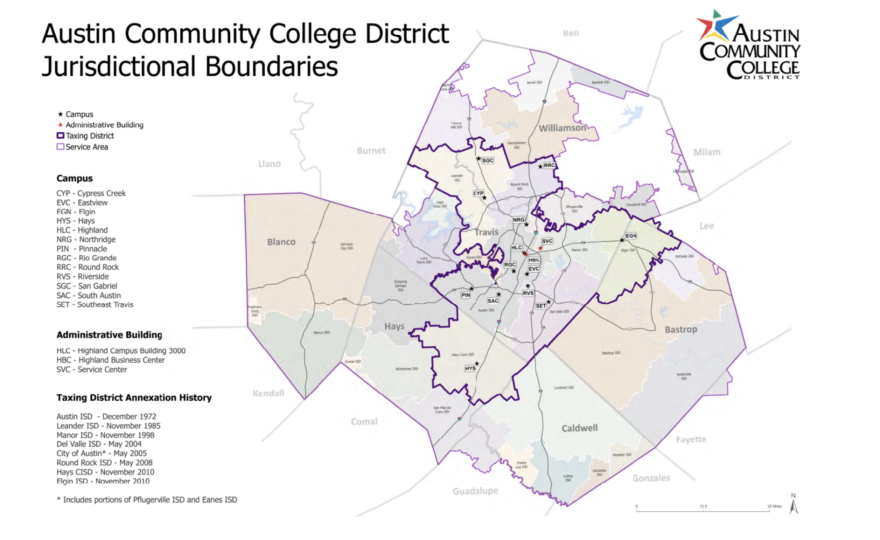The Austin Community College District Board of Trustees on Monday approved a pilot program offering free tuition to local students graduating from high school. Eight board members voted in favor of the program, with one abstaining.
The board’s vote comes several months after ACC Chancellor Russell Lowery-Hart first announced the proposal in January. He described the potential impact of the program to KUT as “life changing” for students. Board Secretary Manny Gonzalez echoed that sentiment during the meeting.
“I don’t know if it’s being a girl dad, but I almost get brought to tears thinking about just how impactful this is going to be to a number of individuals and families in terms of breaking generations of poverty,” Gonzalez said.
The initiative, officially known as the College Affordability Plan, will offer free tuition and general fees to high school seniors in the ACC service area who graduated from public, private and charter schools after July 1, 2023. Students who were homeschooled or completed their GED are also eligible. High schoolers who live in the service area, but not the taxing district, will still need to pay the out-of-district fee. The pilot program begins in fall 2024 and will last for five years.

Areas considered in-district because they contribute to the tax base include Austin ISD, Del Valle ISD, Elgin ISD, Hays CISD, Leander ISD, Manor ISD and Round Rock ISD. Portions of Eanes ISD and Pflugerville ISD located within the city of Austin are also eligible for free tuition and fees.
The primary goal of the program is to attract high school graduates who would not have pursued higher education at all. The college said regional data shows 12,000 Central Texas high school students did not enroll in any higher education institutions after graduating in 2023. ACC also shared that more than half of prospective students cited tuition costs as the reason they started an application but didn’t enroll.
“People are experiencing a life that’s not affordable, and they can’t find a way to climb out and up,” Lowery-Hart said in a statement. “It’s not about getting students in the door. It’s about eliminating barriers so that they not only come, they persist, they graduate, and they enter our local workforce with the skills and talents our community needs.”
There are no GPA requirements or income restrictions for high school graduates to participate in the program. Eligible students will have three years of free tuition to finish their associate degree and obtain any workforce credentials or certifications. On top of that, students who complete their degree within three years and pursue one of the bachelor’s degrees that ACC offers will get two additional years of free tuition.
The College Affordability Plan is what’s known as a “first dollar” program, meaning that funding from ACC will go toward covering college expenses before other sources. ACC said students will be able to use other financial aid, Pell grants and scholarships to pay for other expenses such as textbooks, housing and child care.
“First-dollar programs really help address issues of equity in terms of access to higher education pathways,” Gonzalez said.
ACC estimates the program will cost the college $7.5 million in its first year. A new state law that reworked how Texas funds community colleges is providing the college with an additional $6.8 million in funding that will help offset the program’s cost.
ACC officials predict the cost will reach $18 million in Fiscal Year 2027 and plateau at that point; $18 million is less than 4 percent of the college’s budget.

Board members also said they hope if this pilot program is successful, it can be expanded to other student groups.
“I’m inspired by our own tagline: ‘Start here. Get there.’ I think we start with this cohort, we start with these students and then we figure out how we go back to the students who are with us,” Board Vice Chair Sean Hassan said.
He said the hope is that free tuition could eventually be offered to adult learners like his mom, who got a certified nurse aide degree and then became a licensed vocational nurse.
“Like her, there’ll be students who now, not having to worry about tuition, have a few bucks for their books, have some money for transportation, have some money for child care and other basic needs,” he said.
But Board Chair Barbara Mink, who abstained from the vote, said she wanted to see ACC work on ways to better support current students before offering free tuition to high school graduates.
“There’s a lot of our students out there that are now just struggling to finish college, they’re in here, they’re single parents. Let’s get the processes right for them before we say, ‘Come on in, high school graduates, and get free tuition,’” she said.
To help all current and potential ACC students, the board also voted Monday to keep tuition costs the same for the 11th year in a row. Tuition continues to be $67 per credit hour. With fees, in-district students pay $85 per credit hour. The out-of-district fee will also stay the same at $201, making the total $286 per credit hour for out-of-district students.
This story was produced as part of the Austin Monitor’s reporting partnership with KUT.
The Austin Monitor’s work is made possible by donations from the community. Though our reporting covers donors from time to time, we are careful to keep business and editorial efforts separate while maintaining transparency. A complete list of donors is available here, and our code of ethics is explained here.

